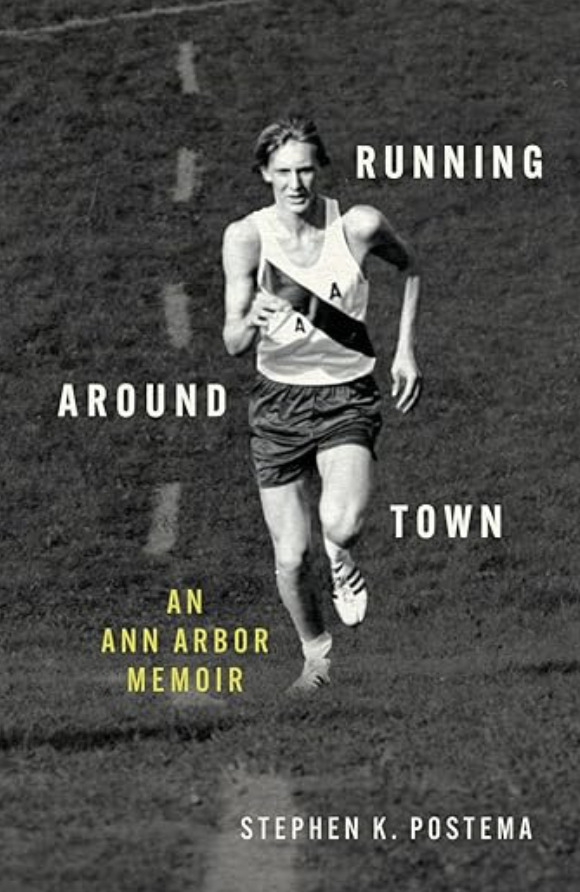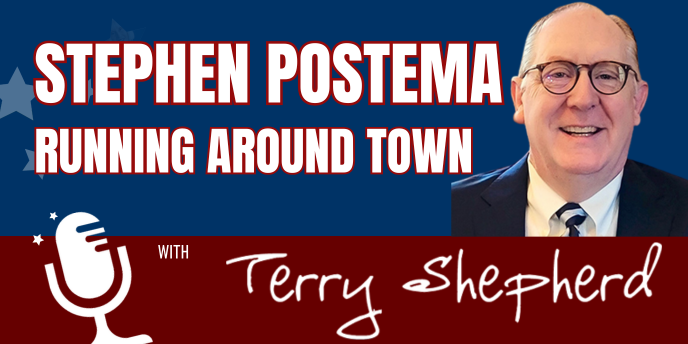Hear the Conversation | Get the Book

In Ann Arbor, Michigan in the mid-sixties, a paper cutout of a blue hand, taped to a window, marked the dwelling as a house of sanctuary. For Stephen Postema, a kindergartner at the time, the symbol was misread. He understood the hand not as an emblem of refuge but of danger, a glyph that meant “run as fast as you can.”
And so, he did. This primal sprint became the unlikely seed of a vocation. Decades later, Stephen is still running, through his city, through ideas, through memory itself. His new book, Running Around Town, is at once a memoir and a field guide: to Ann Arbor, between 1963 and 1977, and to the rhythms of a self being formed in tandem with the city’s own turbulent evolution.
To come of age in a college town then was to live at the edge of everything. The place was a crucible where Midwestern domesticity mingled with radical campus politics and a world-class music scene. Stephen’s vantage point was singular: his father, a pastor, who ran a chapel as a campus ministry that housed street people in the basement in the shadow of the University of Michigan. At eleven, Stephen and his brother earned their afternoons of freedom by performing janitorial services at the chapel on Saturdays. Their reward was unstructured adventure: loitering on “The Diag,” haunting Discount Records, the Middle Earth head shop, and candy counters. “You just made your way in the world,” Stephen remembers. “That’s how it was.”
Running, first an accident, soon became his discipline. Like all American schoolchildren of the era, he was subjected to the Kennedy-era fitness tests, with their dreaded 600-yard dash. Stephen, mischief intact, assumed the results were destined for a federal database, his congressman lived next door, and he wanted to look good.
It turned out he was fast. At the All-City meet, The Slauson Junior High student outran the boys from cross town rivals at Tappan Junior High. A coach’s offhand remark, “You could be the fastest kid in the city”, was enough to transmute casual speed into devotion. The distances stretched: the half mile, the mile. Running became a mode of thought, a meditation, a way to see Ann Arbor in motion.
The Postema household was also thick with music. His father co-founded The Ark, Then as now a legendary folk club. Church hymns led naturally to folk, folk to Dylan, Dylan to Cash, Wonder, and Cooke. Music became connective tissue: between family members, between Black and white teenagers poring over the same Top 40 lists in the Detroit Free Press, between the solitary runner and the pulsing town.
There was also, inevitably, mischief. Stephen held a theological rationale for trespassing: the unused after-hours spaces of Ann Arbor, the campus gymnasiums, the libraries, even the swimming pools, were, to him, a divine trust. “Forgive us our trespasses,” he reasoned, only made sense if you had a few worth confessing. His punishment, when caught, was to sit in his father’s book-lined study, hardly a deterrent. That the boy who delighted in trespass would one day serve as Ann Arbor’s City Attorney is one of those ironies that life distributes with a wink.
Love, meanwhile, was another test of endurance. A geometry problem, combined with too much Percy Sledge, prompted a ninth-grade Stephen to draft a set of axioms for an ideal girlfriend, she should enjoy math, basketball, MASH, and Kung Fu. A sympathetic friend revised the list to include “friendliness.” Stephen duly found a candidate in math class. It lasted four months, until she decamped for an older suitor with a car and a mustache.
Later, during a high-school cast party, he muffed a golden moment, a dance partner’s invitation disguised as small talk, by announcing he had to catch up on calculus homework. Weeks later, chastened, he asked her to the movies. She said yes. She soon brought her own list: four colleges to which they would apply together. They married, and her father, a prominent law professor, nudged him toward the law. “Everything’s connected,” Stephen says. “Music, love, career. It’s all interconnected and it’s random things.”
Ann Arbor was briefly traded for Berkeley, in 1969, when his father, battered by assassinations and campus turmoil, sought respite in sabbatical. They arrived, improbably, in a pop-up camper, after a detour through Mexico, only to find themselves in the thick of California unrest: Zodiac Killer headlines, Charles Manson rumors, and protesters who moonlighted as shakedown artists. Stephen emerged with added street sense, his boyhood widened by dislocation.
In the end, Running Around Town is less about nostalgia than about the granular ways a place imprints itself on a life: in the smell of a record shop, the cadence of Adidas running shoes on pavement, the improvisations of trespass, the kindness of a teacher, the sound track that bound a generation together.
To know a city, Stephen Postema suggests, you must move through stride by stride. Memory, like running, is not a static thing; it is a discipline of motion, of returning again and again to the same streets, altered by time and experience into a life.

